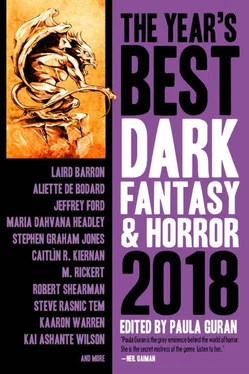Uncle Amir recited a short, elegant grace, thanking Father for giving him and the others at the mill such fulfilling work. Father nodded thoughtfully, and the meal began.
Harry went at once for the fish, taking a whole tilapia for himself. He cut it open just down the middle, pulling away that sweet, flaky meat with his fork before lifting out the spine and troublesome ribs—he’d come back for those later. He scarfed down the fish skin and all, gratefully swallowing and immediately returning for more. The beast rumbled pleasantly in his stomach, its jaws receiving the food Harry chewed for it, its snakelike throat slicked by Harry’s saliva. He returned to the tilapia’s charred head and used the point of his knife to carve out its fleshy cheeks. He especially loved the salt, the sweetness, and the softness of the cheeks—next, the eyes.
He only slowed when he noticed, after a few more throatfuls of fish, that Mother was pinching him under the table. She had dug her fingers into the skin just below where his shorts cut off, twisting the fat on his thigh.
“Harold,” she hissed, mouth drawn. “You’re eating like an animal again.”
Harry put his fork down, pulled his leg away, and wiped his mouth with the napkin. He ignored the heat of her stare, the nettle of her prying, meddling eyes, and focused on his plate.
“That’s settled then!” Father broke away from a conversation with Uncle Amir that Harry hadn’t been listening to. “Harry, my boy, you’re coming to see the mill tomorrow. How about that?”
Harry lifted a slice of the pie off of the serving dish.
“Sure.”
He ate a heaping forkful. It was wonderful: the goat was soft, savory, fatty; the salt and animal juices and hot water crust all came together on his tongue. The beast pushed up, stretching open the base of his esophagus, unfurling its own eager tongue.
Mother put her fork down as she watched, then pushed her full plate away.
“You’ll be lucky to have your father’s job one day,” Uncle Amir said, wiping his moustache with the crisp edge of his napkin. “You have a few years yet, but it’s never too early to get started at the family business.” He gave an ostentatious wink.
Mother excused herself, saying she was beginning to feel nauseous, and Majid came to clear the plates. As he did, heaping dirty silverware on top of plates balanced expertly up his arms, Uncle Amir came and sat next to Harry.
“I have something for you,” he said. “Something you might like too, Reginald.”
Father leaned in, his curiosity piqued. Harry swallowed a mouthful of plantain.
Uncle Amir removed a thin magazine from his briefcase and placed it on the table in front of Harry. It was an old copy of The Cricketer . A player posed heroically on the cover, his bat pitched at a perfect angle, his eyes on an unseen ball spinning into the distance. Beneath the picture it said: FRANK DE CAIRES DOES IT AGAIN!
“Good lord.” Father reached for the magazine. “This was your mother’s, Harry. She had a dozen of these, back when we were together. She loved this man. Worshipped him. What was his name?”—he spoke it slowly, savoring the syllables—“I never thought I’d see this again. Do you know, Amir, did Bibi ever get to see him play?”
“Oh, sure! Mommy went to Bourda whenever they could.” For the first time since he’d come, Amir’s accent slipped through. He corrected himself: “I remember it fondly.”
Father passed the magazine back, and Harry took it gently. He didn’t care much for cricket—sacrilege, if you were to ask the other boys at school—but he knew his mother had, and that was enough.
“Thank you,” he said, glancing up to Uncle Amir.
“My pleasure.”
“Well,” Father said, pushing himself up from the table and giving a mighty stretch, “your Uncle and I have some things to talk through. You should get to bed, my boy. We’ll have a long day tomorrow.”
Harry was in no way looking forward to a long day at the sugar mill, but he gave Father a quick smile, thanked Uncle Amir again, and closed the dining room door behind himself.
The beast flexed its long fingers, pushing a little deeper into the warmth of Harry’s groin, and settled its tongue against the lining of his stomach. There were whole hours when Harry would forget the beast was there at all, hours when he could let his mind wonder at a life that was not consumed by its needs. But it would pop another vein, gorge itself on his blood, his bile, his mucus—and then heal his broken body. He suffered it all without so much as a bruise.
Instead of getting to bed, he eased open the kitchen’s side door. Majid was still there. He had his apron on while he washed grease out of dishes, his face buried in a cloud of steam rising from the sink.
“Oh!” He started when he heard the door close behind Harry. The dishes clattered back into the sink. “You scare me, boy!”
“I’m sorry, Majid. I’m just looking for a little food, if you have any left,” Harry said, playing at coyness as best he could. “Sometimes I’ll just get a little peckish at night.”
“You not eat?” the cook replied testily, cracking open the icebox. “Look how skinny you are, boy.”
“I ate. I’m just still hungry.”
Majid wrapped yesterday’s roti and a hunk of leftover tilapia in paper towels, then put it all on a small plate. Harry took the plate, and the cook returned to the dishes in the sink.
Food in hand, he headed upstairs. Father and Uncle Amir had retreated to the drawing room. He watched for a moment as their shadows moved behind the door’s frosted glass inlay; their voices were pleasant, muffled baritones.
He padded along the hallway at the top of the stairs as softly as he could. The door to Mother and Father’s room was just ajar and the lights were off. The hallway grew darker the further he went along, until he came to his room at the very end. He pulled the door just shut behind himself, slow, then switched the lamp on.
The room had been his for the twelve years he’d lived in this house, but it had been Mother’s collecting room before then. She had a fascination with the tropic wildlife, a real naturalist’s eye, as Father said. She trapped insects—damselflies, dragonflies, orange-spotted butterflies, blister beetles, darkling beetles, velvet ants, boring weevils—and pinned them to huge sheets of Styrofoam leaned against the walls. She’d refused to relocate the collection when Harry moved in, so he’d grown up with them here. Year after year, the bugs’ hollow carcasses would be eaten away by mites, but there was an infinite number of insects in the jungle and Mother never tired of finding more.
Harry was allowed the two bottom drawers of the dresser in his room; all the others were filled with longhorn beetles and boxes of pins. In the very bottom drawer, tucked in a corner behind his always freshly starched school uniforms, he kept the few things he had that reminded him of his birthmother: a fishing hook, a photo of her in front of her old house, and now, The Cricketer . On his knees, he took out the photo. She wasn’t especially beautiful. Her skin was dark—at least, because of Father, Harry was light enough to pass as British—and, like Uncle Amir’s, her front teeth stuck out when she smiled. But his only memories of life with her were golden, sweet things—memories that didn’t include the beast.
“This is disgusting, you know.”
Mother stood in the doorway. Harry shoved the picture back into the drawer, slid it shut. She stepped into the room, blocking the lamplight, and reached a finger down to the plate of food. She flicked the corners of the paper towel apart, revealing the heaping roti and half-eaten fish.
“What’re you going to do with all this?” She adjusted the bow at the neck of her powder-blue nightgown, pulling it breathlessly tight.
Читать дальше












